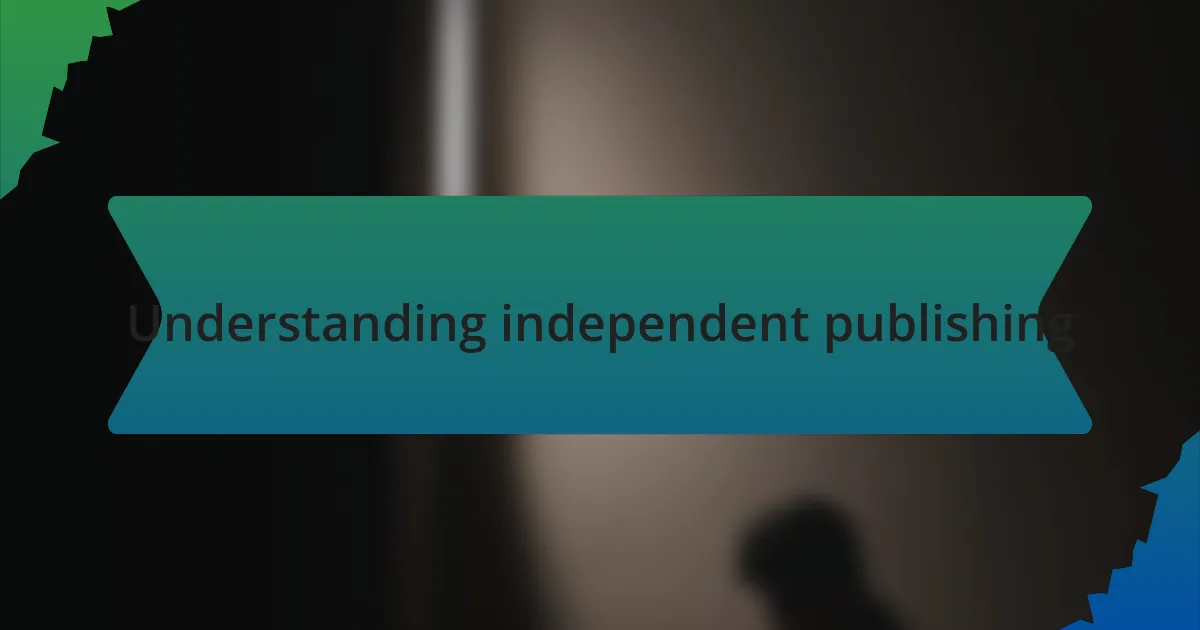Key takeaways:
- Independent publishing offers creative control but comes with challenges like distribution and marketing.
- Maintaining a healthy work-life balance is crucial for creativity and productivity.
- Effective time management techniques, such as the Pomodoro Technique and time blocking, enhance focus and reduce procrastination.
- Setting realistic, flexible writing goals fosters motivation and avoids burnout.

Understanding independent publishing
Independent publishing opens a door to creative freedom that traditional publishing often restricts. It allows writers like me to maintain complete control over our work—everything from the content to the design, and even the marketing strategies. I remember the thrill I felt when I published my first book independently; it was a profound experience deciding every single detail without a gatekeeper.
Understanding this landscape requires appreciating the challenges along with the rewards. Many face issues like distribution and marketing that can feel overwhelming. I once grappled with how to reach my audience effectively, but embracing social media and connecting directly with readers transformed my approach. Isn’t it empowering to know that you can build a community around your work?
Moreover, independent publishing often fosters a sense of immediacy that’s hard to find elsewhere. When I decide to write and publish on a whim, the excitement is palpable—as if the words are rushing to meet the moment. Doesn’t that sense of urgency resonate with the creative spirit in all of us? Being able to share my voice with the world, on my terms, is one of the most fulfilling aspects of this journey.

Importance of work life balance
Achieving a healthy work-life balance is crucial for long-term success in independent publishing. When I first started, I often found myself swept away by the passion for my projects, losing track of time and neglecting personal relationships. It became clear to me that without dedicating time to recharge and connect with loved ones, my creativity dwindled. Have you ever noticed how taking even a short break can spark fresh ideas and perspectives?
Balancing work and life also enhances productivity. I’ve learned that scheduling time for hobbies or even simple relaxation can rejuvenate my mind. For instance, setting aside a few hours each week for outdoor activities helped me return to my writing desk with renewed energy. It’s remarkable how stepping away from the keyboard can lead to breakthroughs I wouldn’t have achieved while grinding through endless hours of work.
Furthermore, maintaining this balance lessens stress and prevents burnout, allowing me to enjoy the writing journey more fully. I vividly remember days filled with procrastination and frustration, which shifted significantly once I committed to a more balanced routine. Recognizing the importance of self-care was a game changer. Have you reflected on how your work-life balance affects your creativity? It’s a vital aspect that deserves our attention, as it directly influences the stories we tell and how we connect with our audience.

Techniques for effective time management
When it comes to managing my time effectively, the Pomodoro Technique has been a game-changer for me. It’s simple: I work for 25 minutes, then take a 5-minute break. This method not only helps me stay focused but creates a sense of urgency that fuels my creativity. I often catch myself thinking, “What can I accomplish in the next 25 minutes?” This mindset really transforms how I approach my writing sessions.
Another technique I found beneficial is time blocking. I allocate specific hours in my calendar for writing, editing, and even leisure activities. At first, I was skeptical about being so rigid with my schedule, but I realized it significantly reduced my tendency to procrastinate. Have you ever noticed how clearer your mind feels when you know exactly what to expect from your day? When I embraced time blocking, I discovered hours I once wasted on indecision were now filled with productive, meaningful work.
Lastly, prioritization has also played a vital role. I often start my week by listing my tasks and categorizing them by importance. This way, I ensure that my most pressing writing projects receive the attention they deserve first. I recall weeks when I was overwhelmed with deadlines, yet when I tackled high-priority items first, I felt a weight lift off my shoulders. How do you assess what needs your attention? Finding a system that works for you can bring remarkable clarity and efficiency to your writing journey.

Setting realistic writing goals
Setting realistic writing goals is crucial for maintaining motivation and avoiding burnout. I remember a time when I set an ambitious target of writing 2,000 words a day. Initially, it felt exhilarating, but soon I found myself staring blankly at the screen, frustrated and overwhelmed. Have you ever felt that pressure crush your creativity? It made me realize that smaller, attainable goals, like 500 words a day, align better with my lifestyle while still pushing my limits.
I’ve also learned the importance of flexibility in goal-setting. Sometimes, life throws unexpected challenges my way—like a sudden family commitment or an urgent work deadline. In those moments, I give myself permission to adjust my goals. Instead of viewing these changes as setbacks, I now see them as opportunities to recalibrate my writing pace. Have you considered how adapting your goals can lead to unexpected bursts of creativity? For me, those adjustments have often led to richer, more meaningful content.
Another aspect I prioritize is specificity in my goals. Rather than simply stating, “I want to write more,” I focus on actionable steps. For instance, I now specify, “I will write for 30 minutes every morning before work.” This clarity not only helps me stay focused but also allows me to celebrate small wins. I find that acknowledging these incremental achievements boosts my confidence and keeps my passion for writing alive. What small victories have you celebrated lately in your writing journey?

Prioritizing personal commitments
Personal commitments often demand our attention and energy, reminding us that life exists beyond our writing endeavors. I recall a time when I was consumed by a manuscript deadline, neglecting family dinners and friendships. It took a heartfelt conversation with a close friend to help me realize that those moments were just as important as my writing milestones. Have you ever had to choose between an event or your work? I learned that stepping away to prioritize my personal life not only restored my spirit but also enriched my writing when I returned to it.
I’ve found that scheduling personal commitments around my writing sessions creates a balanced rhythm in my daily life. For example, I deliberately reserve weekends for family outings or volunteering. This approach nurtures connections with loved ones and helps me recharge. It’s remarkable how a simple day trip can spark fresh ideas or inspire new characters. Have you considered how your relationships can fuel your creativity? Often, the experiences I share with family and friends filter into my work, adding depth and authenticity to my stories.
Moreover, I’ve tailored my writing schedule to honor significant family events or personal milestones, allowing me to fully engage in both worlds. I remember when my sister graduated; I adjusted my writing plan to make room for celebration, knowing it was a once-in-a-lifetime occasion. Prioritizing these life events not only strengthens my relationships but also brings balance to my creative process. What moments are you currently making space for in your life? Embracing these priorities can lead to a more fulfilling and holistic writing journey.

Creating a conducive writing environment
Creating a conducive writing environment starts with finding a space that nurtures your creativity. I remember when I transformed a corner of my home into a dedicated writing nook, complete with soft lighting and inspiring quotes on the wall. That small change drastically improved my focus. Have you considered how your physical space affects your productivity? A clutter-free environment can significantly enhance your thought process.
I also believe that the atmosphere surrounding you can influence your writing flow. While working on a new project, I often play instrumental music in the background. This practice keeps distractions at bay and allows my thoughts to roam freely. Have you tried the power of sound in your creative space? Each melody seems to evoke a different emotion in my writing, helping me connect with my characters on a deeper level.
Another crucial element is eliminating distractions, particularly during peak writing times. I’ve set boundaries with family and friends to ensure uninterrupted writing sessions, especially when deadlines approach. Reflecting on this choice, I’ve noticed how valuable uninterrupted time is for diving deep into my creative flow. How do you protect your writing time from interruptions? By being clear about my needs, I’m better able to engage in my writing without the constant pull of outside demands.

Strategies for staying motivated
Staying motivated in writing can sometimes feel like chasing a fleeting shadow. Personally, when I’m faced with writer’s block, I turn to goal-setting. For instance, I break my work into specific, achievable milestones. Rather than saying “I’ll finish my book,” I focus on writing just one chapter this week. This tangible goal not only makes the task less daunting but creates a rewarding sense of accomplishment. How do you tackle large writing projects without feeling overwhelmed?
Another strategy that keeps me energized is joining writing groups. Sharing my work and discussing ideas with fellow writers breathes fresh life into my creative process. I vividly remember attending a local writer’s meet-up where feedback from peers reignited my passion for a story I had shelved. The camaraderie can spark inspiration and remind me that I’m not alone in this journey. Have you thought about how collaboration could enhance your writing routine?
Lastly, I find that rewarding myself boosts my motivation. After completing a tough section, I take a moment for self-care; it could be indulging in a favorite treat or taking a scenic walk to recharge. This simple act reinforces a positive association with writing and encourages me to keep pushing through. When was the last time you celebrated a writing win, no matter how small? Acknowledging those moments can transform your motivation into a more sustainable rhythm.